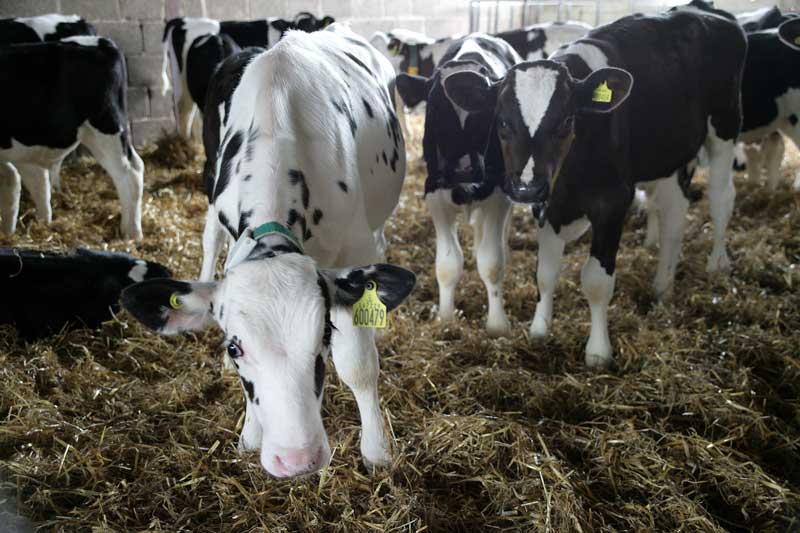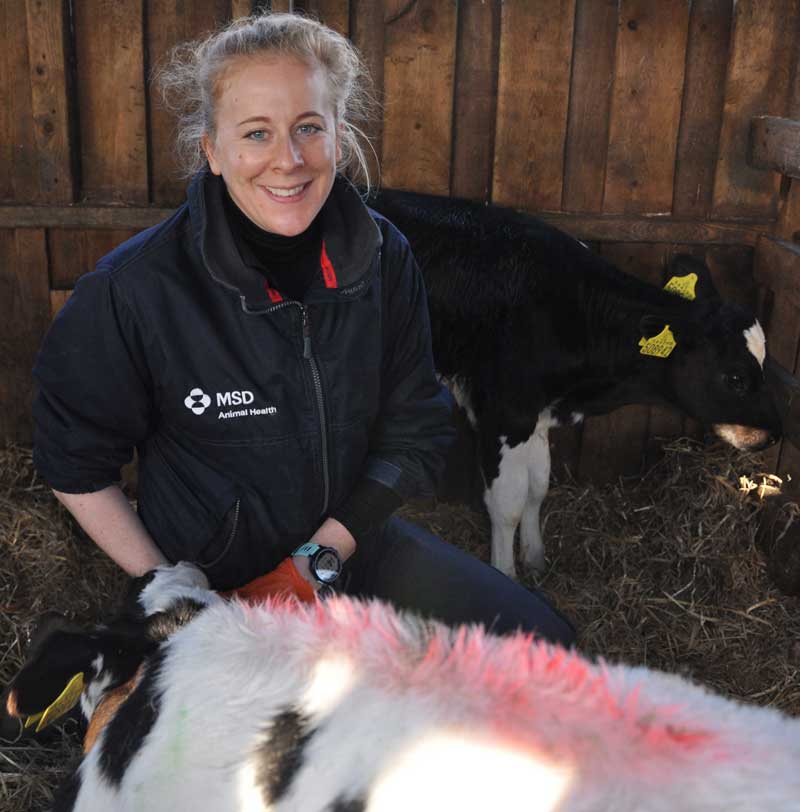Advertorial
21 May 2025
Rising paromomycin resistance forces rethink in calf scours management
Kat Baxter-Smith, vet advisor at MSD Animal Health, says vets need to lead a “mindset shift” away from routine antibiotics to manage neonatal calf diarrhoea.

Vets are being urged to reassess their approach to managing neonatal calf diarrhoea, following new evidence showing an alarming rise in resistance to paromomycin, a commonly used antibiotic for treating E coli K99 infections.
The March 2025 Cattle Highlights Report from the Royal GD in the Netherlands reveals a concerning trend in antimicrobial resistance (AMR), showing that the proportion of paromomycin-resistant isolates has jumped from 48% in 2021 to 72% in 2024 – indicating a significant shift in AMR patterns.
The report also highlights an increase in the detection of cryptosporidiosis in calves up to 14 days of age. While it is unclear whether paromomycin is being used to treat E coli or cryptosporidiosis, the rising use of the antibiotic could be contributing to greater exposure and increased resistance in E coli K99.
Kat Baxter-Smith, a vet advisor at biopharmaceutical and technology solutions provider MSD Animal Health, says that while paromomycin is often used as a matter of routine, when it is used extensively and routinely – especially when applied across the youngstock in whole herds – it could exacerbate the issue of AMR.

Dr Baxter-Smith said: “What we need now is a mindset shift – moving away from routine antibiotic use and towards a more robust, preventive management strategy.
“It’s not about eliminating treatment altogether, but using it only when it is really needed.”
She stresses that a proactive, preventive approach to managing neonatal calf diarrhoea alongside vaccination is the most effective way to control it in calves.
She said: “Vaccination, clean pens, and ensuring that every calf receives the right volume and quality of colostrum are the real cornerstones of effective scour control.
“Using vaccines such as Bovilis® Rotavec® Corona for rotavirus, coronavirus, and E coli and Bovilis Cryptium® for Cryptosporidium parvum is one of the most effective ways to reduce the incidence of neonatal diarrhoea.
“By vaccinating the dam, we ensure the calf has the best possible immunity at birth by ingesting the fortified colostrum and transition milk in the first days of life, which significantly reduces reliance on antibiotics and minimises disease risks.”

However, Dr Baxter-Smith stresses that no product can compensate for poor management. She said: “If we’re serious about calf health and tackling antimicrobial resistance, we need to make preventive care a non-negotiable priority.”
The report emphasises key best-practice principles such as:
- Effective colostrum management. Ensuring calves receive clean, high-quality colostrum within the first two hours of birth to provide essential antibodies.
- Excellent hygiene and housing. Maintaining dry, clean, well-ventilated environments and using disinfectants with proven efficacy against scour pathogens to reduce pathogen load and calf stress.
- Balanced dry cow transition. Ensuring dry cows are in optimal health to improve colostrum quality and boost immune transfer to calves.
- Strategic vaccination of the dam. Using vaccines such as Bovilis® Rotavec® Corona (for rotavirus, coronavirus and E coli) and Bovilis Cryptium® (for Cryptosporidium) to enhance maternal immunity and provide protection to calves via colostrum.
The report also recommends halofuginone (Halocur) as the first-line treatment for cryptosporidiosis, due to its targeted action and significantly lower risk of contributing to AMR.
Dr Baxter-Smith added: “By embracing these proactive strategies, vets and farmers can take a crucial step towards safeguarding calf health, reducing reliance on antibiotics, and combating the growing threat of antimicrobial resistance.”
View the full report here.
Product information
Bovilis Cryptium® contains Cryptosporidium parvum Gp40. POM-V.
Bovilis® Rotavec® Corona contains inactivated rotavirus, coronavirus and E coli strain CN7985 serotype O101:K99:F41 POM-VPS.
Halocur® contains 0.5mg/ml halofuginone lactate in an aqueous excipient. POM-V.
Further information is available from the SPC, datasheet or package leaflets. MSD Animal Health UK Limited. Registered office Walton Manor, Walton, Milton Keynes MK7 7AJ, UK. Registered in England & Wales no. 946942. Advice should be sought from the medicine prescriber.
Prescription decisions are for the person issuing the prescription alone.
Use Medicines Responsibly.
© 2025 MSD Animal Health UK Limited. All Rights Reserved.

